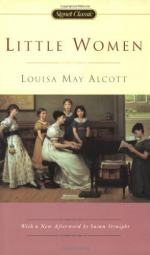Jo’s keen eyes were rather dim for a minute, and her thin face grew rosy in the firelight as she received her father’s praise, feeling that she did deserve a portion of it.
“Now, Beth,” said Amy, longing for her turn, but ready to wait.
“There’s so little of her, I’m afraid to say much, for fear she will slip away altogether, though she is not so shy as she used to be,” began their father cheerfully. But recollecting how nearly he had lost her, he held her close, saying tenderly, with her cheek against his own, “I’ve got you safe, my Beth, and I’ll keep you so, please God.”
After a minute’s silence, he looked down at Amy, who sat on the cricket at his feet, and said, with a caress of the shining hair . . .
“I observed that Amy took drumsticks at dinner, ran errands for her mother all the afternoon, gave Meg her place tonight, and has waited on every one with patience and good humor. I also observe that she does not fret much nor look in the glass, and has not even mentioned a very pretty ring which she wears, so I conclude that she has learned to think of other people more and of herself less, and has decided to try and mold her character as carefully as she molds her little clay figures. I am glad of this, for though I should be very proud of a graceful statue made by her, I shall be infinitely prouder of a lovable daughter with a talent for making life beautiful to herself and others.”
“What are you thinking of, Beth?” asked Jo, when Amy had thanked her father and told about her ring.
“I read in Pilgrim’s Progress today how, after many troubles, Christian and Hopeful came to a pleasant green meadow where lilies bloomed all year round, and there they rested happily, as we do now, before they went on to their journey’s end,” answered Beth, adding, as she slipped out of her father’s arms and went to the instrument, “It’s singing time now, and I want to be in my old place. I’ll try to sing the song of the shepherd boy which the Pilgrims heard. I made the music for Father, because he likes the verses.”
So, sitting at the dear little piano, Beth softly touched the keys, and in the sweet voice they had never thought to hear again, sang to her own accompaniment the quaint hymn, which was a singularly fitting song for her.
He that is down need fear
no fall,
He that is low no pride.
He that is humble ever shall
Have God to be his guide.
I am content with what I have,
Little be it, or much.
And, Lord! Contentment
still I crave,
Because Thou savest such.
Fulness to them a burden is,
That go on pilgrimage.
Here little, and hereafter
bliss,
Is best from age to age!
CHAPTER TWENTY-THREE
AUNT MARCH SETTLES THE QUESTION




